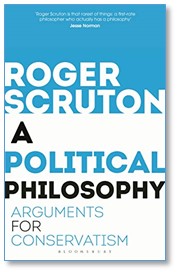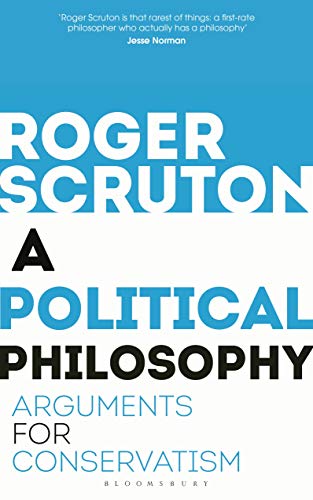 In Roger Scruton’s book A Political Philosophy: Arguments for Conservatism, he makes some trenchant observations about Marxism and totalitarianism. He writes:
In Roger Scruton’s book A Political Philosophy: Arguments for Conservatism, he makes some trenchant observations about Marxism and totalitarianism. He writes:
It is not the truth of Marxism that explains the willingness of intellectuals to believe it, but the power that it confers on intellectuals, in their attempts to control the world. And since, as Swift says, it is futile to reason someone out of a thing that he was not reasoned into, we can conclude that Marxism owes its remarkable power to survive every criticism to the fact that it is not a truth-directed but a power-directed system of thought. [p. 149]
He goes on to explain Marxism’s revolutionary spirit and tendency toward totalitarianism. It is difficult not to read these words as shedding light on current events. Scruton argues that totalitarian revolutions are built on resentment:
Totalitarian ideologies are ways to recruit resentment… Totalitarian systems of government and totalitarian ideologies have a single source, which is resentment. I don’t see resentment as Nietzsche saw it, as peculiar to the ‘slave morality’ of a Christian or post-Christian culture. I see it as an emotion that arises in all societies, being a natural offshoot of the competition for advantage. Totalitarian ideologies are adopted because they rationalize resentment, and also unite the resentful around a common cause. Totalitarian systems arise when the resentful, having seized power, proceed to abolish the institutions that have conferred power on others: institutions like law, property and religion which create hierarchies, authorities and privileges, and which enable individuals to assert sovereignty over their own lives. To the resentful these institutions are the cause of inequality and therefore of their own humiliations and failures. In fact they are the channels through which resentment is drained away. Once institutions of law, property and religion are destroyed — and their destruction is the normal result of totalitarian government — resentment takes up its place immovably, as the ruling principle of the State.
For the resentful there is no such thing as real authority or legitimate power. There is only pure power, exercised by one person over another, and diagnosed through Lenin’s famous questions: ‘Who? Whom?’. Once in power, therefore, the resentful are inclined to dispense with mediating institutions, and erect a system of pure power relations, in which individual sovereignty is extinguished by central control. They may do this in the name of equality, meaning thereby to dispossess the rich and the privileged. Or they may do it in the name of racial purity, meaning thereby to dispossess the aliens who have stolen their birthright. One thing is certain, however, which is that there will be target groups. Resentment, in the form of it that I am considering, is not directed against specific individuals, in response to specific injuries. It is directed against groups, conceived as collectively offensive and bearing a collective guilt. [pp. 150-51]
In Scruton’s reckoning of things, Marxism eventually degrades into a kind of identity politics that trades on in-groups, out-groups, and shame. He writes:
In every totalitarian experiment, therefore, you will find that the first act of the centralized power is to single out certain groups for punishment. The Jacobins targeted the aristocracy, later expanded to the ubiquitous ’emigrés’, whose invisible presence licensed the most arbitrary murders and exterminations. The Nazis singled out the Jews, on account of their material success and because their apartness was both real and hidden. The Russian communists began with the bourgeoisie, but were fortunate in having to hand another and more artificial class of victim: the kulaks, a class created by the State, which could therefore easily be destroyed by the State. One function of the ideology is to tell an elaborate story about the target group, showing it to be less than human, unjustly successful and intrinsically worthy of punishment. Nothing is more comforting to the resentful than the thought that those who possess what they envy possess it unjustly. In the worldview of the resentful success is not a proof of virtue but, on the contrary, a call to retribution.
That explains why totalitarian ideologies invariably divide human beings into innocent and guilty groups. Behind the impassioned rhetoric of the Communist Manifesto, behind the pseudo-science of the labour theory of value, and behind the class analysis of human history, lies a single emotional source — resentment of those who control things. This resentment is both rationalized and amplified by the proof that property-owners form a ‘class’. According to the theory the ‘bourgeois’ class has a shared moral identity, a shared and systematic access to the levers of power and a shared body of privileges. Moreover, all those good things are acquired and retained ‘at the expense of’, or through the ‘exploitation’ of, the proletariat, which has nothing to part with except its labour, and which will, therefore, always be cheated of what it deserves. [pp. 151-52]
Reading this material earlier this evening was disconcerting, to say the least. As we look around us today, it seems that there are some who wish not merely to reform the American experiment but to abolish it. I think we are already beginning to see shades of a soft-totalitarianism. From there it is a short step to the real thing.
There is more to say on this, and perhaps I will later. In the meantime if you’re interested in more of this, see Scruton’s chapter “The Totalitarian Temptation” in A Political Philosophy: Arguments for Conservatism.





